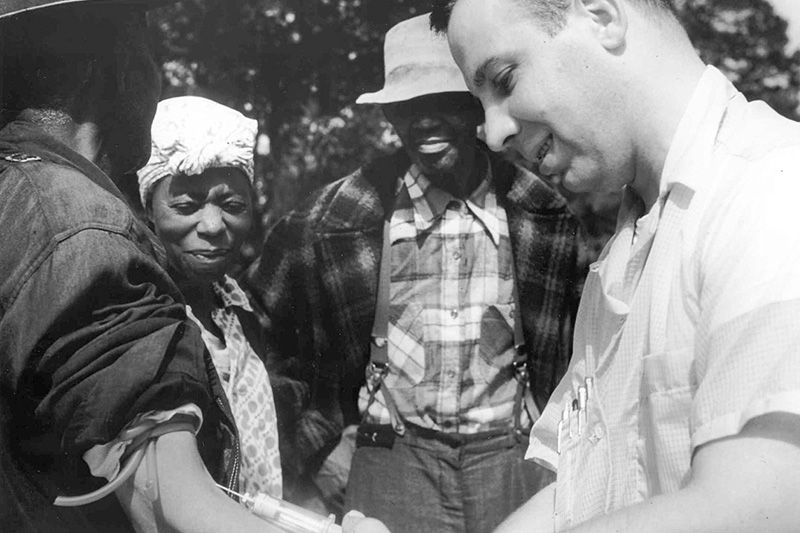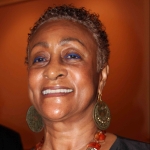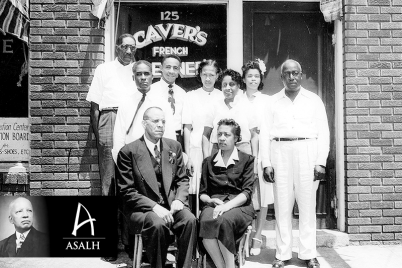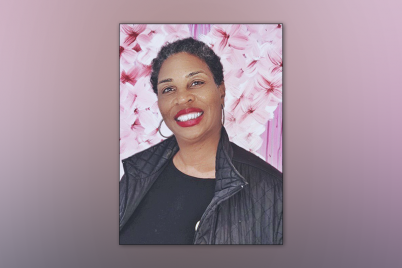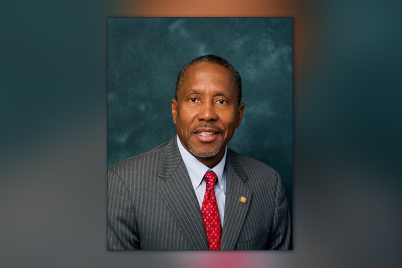Doctor drawing blood from a patient as part of the Tuskegee Syphilis Study
By Attorney Jacqueline Williams Hubbard, ASALH, President
The Tuskegee Experiment was conducted under the United States Public Health Service auspices and, in its early days, often used as a facilitator, the Tuskegee Institute, now Tuskegee University.
The experiment involved nearly 600 Black male participants in Alabama, all of who remained untreated during the 40-year study of the effects of syphilis. Three hundred ninety-nine men were infected with syphilis, and 201 were not infected.
None of the participants were ever treated for the disease, and none of the men were told they had been diagnosed with syphilis. This experiment had an extremely harmful effect on the men in the study and their families.
According to the History Channel, by the time 1972 rolled around, 28 participants perished from syphilis; 100 more passed away from related complications. At least 40 spouses had been diagnosed with it, and the disease had been passed to 19 children at birth.
After the experiment ended, according to the Center for Disease Control and Prevention, the government started the Tuskegee Health Benefit Program, which promised to give lifetime medical benefits and burial services to all of the living participants.
In Jan. 2004, the last study participant passed away, and the last widow receiving health benefits died in Jan. 2009. Currently, there are 11 offspring receiving medical and health benefits.
The Tuskegee Experiment is one of the most horrible racial medical crimes conducted in the United States, but not the first. Enslaved and indigenous populations were subjected to medical experimentation as far back as the 17th century.
In the antebellum period, J. Marion Sims revolutionized gynecology by experimenting on enslaved women without anesthesia, which had recently become available. According to the New York Times, it took dozens of operations before he reported success, with one enslaved woman named Anarcha being operated on 30 times.
Medical experimentation has had lasting ill effects on trust in the Black community, including the vaccine for the COVID-19 virus.
This suspicion is understandable once the facts of the Tuskegee Experiment are known. However, this suspicion should not be used as justification not to take one of the COVID-19 vaccines, or on the other hand, for the government’s failure to make the vaccines uniformly available to everyone.
The COVID-19 vaccines have been studied in thousands of people of all ethnic groups. Several of these vaccines are very effective in combatting the virus.
African-American leadership needs to ensure these vaccines are made available in the Black community. The pandemic is devastating, and Black Americans need protection.
Fear should be put aside and practicality and judgment put in its place.
The CDC Tuskegee Timeline
1895
Booker T. Washington at the Atlanta Cotton Exposition, outlines his dream for black economic development and gains support of northern philanthropists, including Julius Rosenwald (President of Sears, Roebuck and Company).
1900
Tuskegee educational experiment gains widespread support. Rosenwald Fund provides monies to develop schools, factories, businesses, and agriculture.
1915
Booker T. Washington dies; Robert Moton continues work.
1926
Health is seen as inhibiting development and major health initiative is started. Syphilis is seen as major health problem. Prevalence of 35 percent observed in reproductive age population.
1929
Aggressive treatment approach initiated with mercury and bismuth. Cure rate is less than 30 percent; treatment requires months and side effects are toxic, sometimes fatal.
“Wall Street Crash”–economic depression begins.
1931
Rosenwald Fund cuts support to development projects. Clark and Vondelehr decide to follow men left untreated due to lack of funds in order to show need for treatment program.
1932
Follow-up effort organized into study of 399 men with syphilis and 201 without. The men would be given periodic physical assessments and told they were being treated. Moton agrees to support study if “Tuskegee Institute gets its full share of the credit” and black professionals are involved (Dr. Dibble and Nurse Rivers are assigned to study).
1934
First papers suggest health effects of untreated syphilis.
1936
Major paper published. Study criticized because it is not known if men are being treated. Local physicians asked to assist with study and not to treat men. Decision was made to follow the men until death.
1940
Efforts made to hinder men from getting treatment ordered under the military draft effort.
1945
Penicillin accepted as treatment of choice for syphilis.
1947
USPHS establishes “Rapid Treatment Centers” to treat syphilis; men in study are not treated, but syphilis declines.
1962
Beginning in 1947, 127 black medical students are rotated through unit doing the study.
1968
Concern raised about ethics of study by Peter Buxtun and others.
1969
CDC reaffirms need for study and gains local medical societies’ support (AMA and NMA chapters officially support continuation of study).
1972
First news articles condemn studies.
Study ends.
1973
Congress holds hearings and a class-action lawsuit is filed on behalf of the study participants.
1974
A $10 million out-of-court settlement is reached.
The U.S. government also promised to give lifetime medical benefits and burial services to all living participants; the Tuskegee Health Benefit Program (THBP) was established to provide these services.
1975
Wives, widows and offspring were added to the program.
1995
The program was expanded to include health as well as medical benefits.
1997
On May 16th President Clinton apologizes on behalf of the Nation.
1999
Tuskegee University National Center for Bioethics in Research and Health Care hosts 1st Annual Commemoration of the Presidential Apology.
2001
President’s Council on Bioethicsexternal icon was established.
2004
CDC funds 10 million dollar cooperative agreement to continue work at Tuskegee University National Center for Bioethics in Research and Health Care.
2004
The last U.S. Public Health Service Syphilis Study at Tuskegee participant dies on January 16.
2006
Tuskegee University holds formal opening of Bioethics Center.
2007
CDC hosts Commemorating and Transforming the Legacy of the United States Public Health Service (USPHS) Syphilis Study at Tuskegee.
2009
The last widow receiving THBP benefits dies on Jan. 27.
Attorney Jacqueline Hubbard graduated from the Boston University Law School. She is currently the president of the St. Petersburg Branch of the Association for the Study of African American Life and History, Inc.

